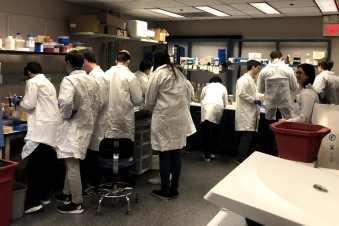Courses

We are in the process of making all cell ag course materials available for anyone to access here. If you would like to view a syllabus or lecture, please reach out and we are happy to share.
Cellular Agriculture & Biofabricated Foods (Lecture Course, BME-173/NUTR0253) – Catalyzed by the coronavirus pandemic, the lab course was adapted to a remote lecture-based course to cover technical and non-technical aspects of cellular agriculture technology, such as: the history of food biotechnology, fundamentals of cellular agriculture (cell biology, bioprocess scale-up and scaffolding system design), consumer research, conventional meat science and novel food regulatory frameworks. The class is now a permanent course in the Biomedical Engineering Department and will be taught each Fall semester. Together with the Lab Course, this will offer a year-long comprehensive introduction to the technical aspects of cellular agriculture, along with social, environmental, and regulatory considerations.

Cellular Agriculture & Cultured Meat Lab (Lab Course, BME-174/NUTR0254) – Through the Tufts Experimental College, Tufts students designed and taught the first undergraduate lab course for cellular agriculture techniques in Spring 2020. The class is now a permanent course in the Biomedical Engineering Department and will be taught each Spring semester. The course covers the entire process of making cultured meat, from the initial animal muscle and fat precursor cell isolations, to the generation of muscle and adipose constructs using 3D tissue engineering techniques, to the final food and meat science evaluations of the students’ in-house produced cultured meat. Through the process, students pick up cell/tissue culture skills while exploring scaffold fabrication and biomaterials engineering, as well as methods of protein fermentation.
Cell Ag Sustainability and Circularity in Process Design (BME194-04) — This course explores biomanufacturing process development, with the aim of generating essential products using regenerative and sustainable approaches to manufacturing. Students will consider raw materials selection, learn about life cycle analysis, and explore options for recycling and reusing waste streams. Throughout the course, students will apply their learnings to a project of their choice, and at semester end will deliver their proposal for producing a product using a sustainable and circular process.
Sustainable Materials (BME193-03) —In this course, you will gain an understanding of materials utilized in consumer products and everyday life from an environmental sustainability, human health, and global impact perspective. ‘Sustainable Materials’ will provide context to what we use today for plastics and other materials, and how the needs and directions for such use are changing toward more sustainable alternatives – including the motivations, methods and progress. We will look at materials as a microcosm of needs on the planet and how we can actively participate in the solutions. The course will include fundamental knowledge (e.g., mechanisms of synthesis and characterization, sources of materials, processing methods, mechanisms of breakdown, re-use of materials), new and emerging strategies in the field, methods to assess sustainability, and future needs and visions. It will also include discussions on how sustainable materials fit within lifecycle analyses, cover current news and views on the topic, emerging solutions, and include projects to address new ideas.
Value Creation in Cell Ag (BME193-03) – This course explores the concept of value creation in the emerging field of cellular agriculture, a field that has the potential to revolutionize how humans relate to food. Students will examine the fundamental questions and unmet needs in this rapidly evolving industry. Each week will be split into two complementary classes: a discussion-based lecture to explore a key topic in cellular agriculture and an active-learning workshop to practice design of impactful solutions. Students will be exposed to topics including ethical, legal, and social implications (ELSI) of cellular agriculture, technical opportunities, and market considerations. Course assignments will emphasize teamwork, discussion, and design philosophy.